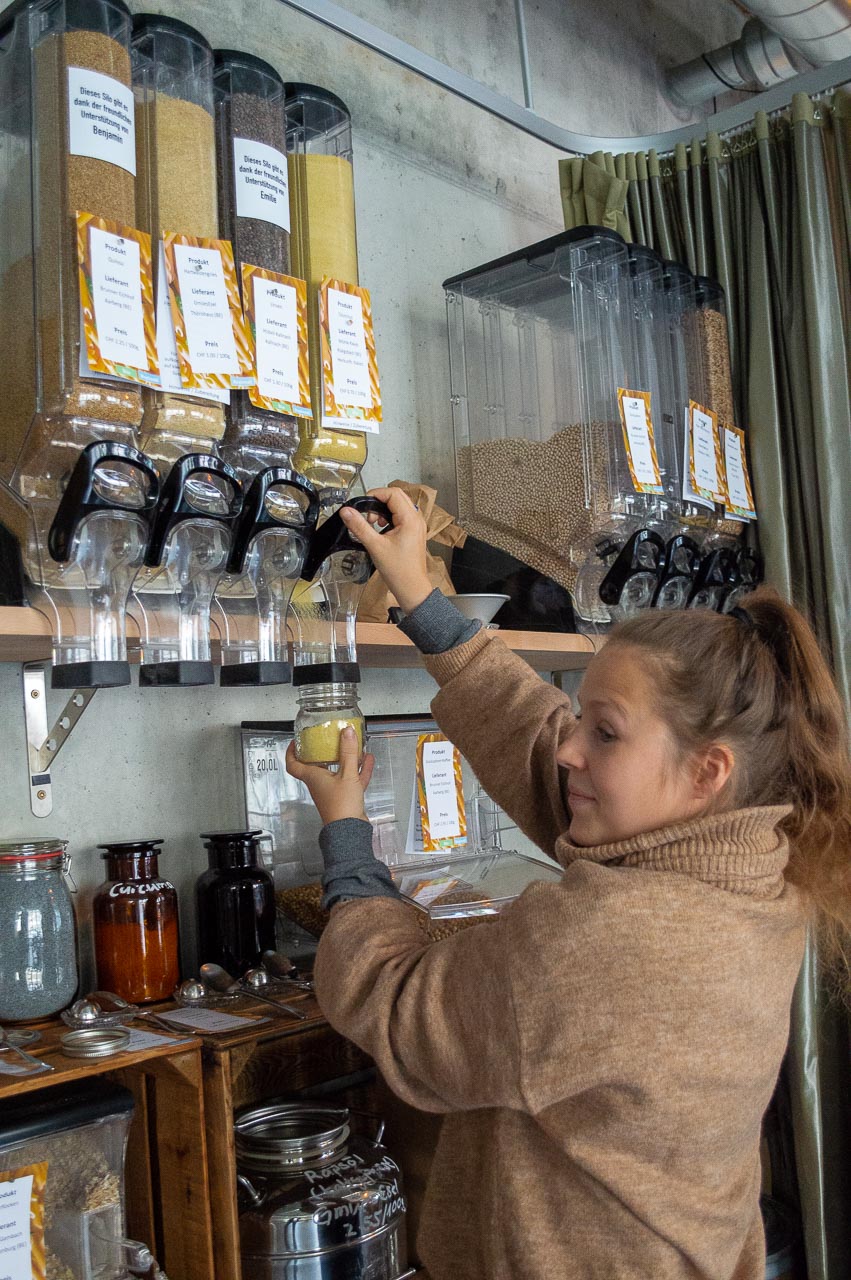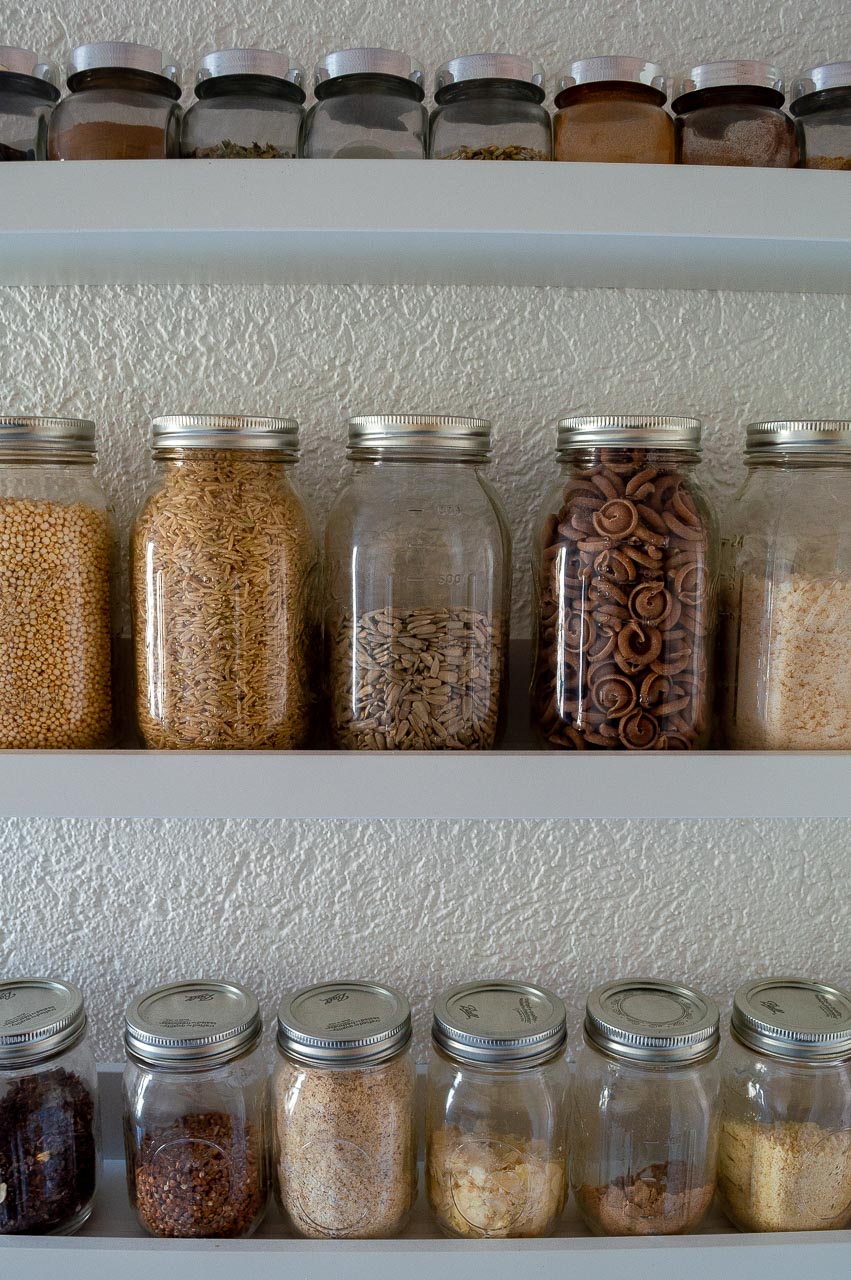This blog post also is available in German.
You remember the last time we were talking about sustainability? I guess it’s been a while… But there’s still so many aspects of that topic to cover, which is why today‘s post is going to be all about sustainability, especially about transforming your life into as plastic free as possible. I’m going to share 20 tips on how your kitchen is going to be plastic free in a heart beat. But no pressure, you don‘t have to implement all the advice in this post over night. Some of them might take time and it‘s ok if some of them are not doable for you personally. The main objective of me writing this is to raise awareness, making you start thinking about the outcome of your actions. Because every single one of us can do great things for the well-being of this planet and even if you’re implementing today’s tips step by step, it‘s totally fine! Baby steps count as well!
Why going plastic free in the first place? Because plastic hurts our environment and plastic is one of the materials which takes years until it`s degraded. The small free plastic bag you took to transport your supermarket veggies can take up to 33 years until it`s completely gone, the plastic bottle you buy can even take up to 500 years! Not to mention how plastic waste pollutes our oceans, kills animals who digest that very plastic and ends up in our bodies in form of micro plastic. I could go on and on about the damaging effects of plastic, but I think it`s better to dedicate it a whole article itself. Promise that I`ll write one in the future, but today we wan`t to start learning a few things on how to make your kitchen a plastic free and sustainable place.
1. Shop at the farmers market
Why this makes a difference compared to the supermarket? Well in lot`s of supermarkets the organic produce, like veggies and fruits, are wrapped in plastic, which is nonsense. No idea why they do it like that, but it is what it is. That`s not the case with the farmers market, there you`ll find all fresh produce without any packaging. On top of that you can shop local and organic. Just make sure to bring your own bags, as some of the sellers will automatically pack the products you choose into plastic bags. Don`t be afraid of telling them to put everything into the bags you brought. They will understand.
If you`re one of those people who are very busy or you don`t have any farmers market near the place you live, there`s also the possibility to get a subscription to a veggie and fruit delivery. I will dive into the pro`s and con`s of this possibility in a separate blog post.
2. Shop staples at the bulk store
Some smart people understood the need of stores selling staples without any packaging. Nowadays you`ll find bulk stores in lot`s of cities. How these stores work? Pretty easy, you bring your own bags, mason jars and/or Tupperware, you fill them with the staples you need and you pay by weight. It`s like the old times back to how shopping was for our grandparents. Most of the bulk stores have a great selection of staples you can buy there, from granola, flour, legumes, pasta, rice, grains, dried fruits, up to cleansers for your household or products for your bathroom.
3. Buy in glasses if possible
Let`s be real, some ingredients are not available in bulk stores, so sometimes you can`t avoid a little trip to the supermarket. That`s fine, just remember: whenever you have the choice pick the option in the glass. Chickpeas in the can or in the glass? Go for the glass! Vinegar in plastic bottle or glass bottle? Correct, you take the one in the glass bottle. Lot`s of staples come packed in glass ware too, so go for it. Nice side benefit, you can reuse the glasses. Some make nice vases, or you can store ingredients in them. Actually same goes for cans, don`t throw them away, use them as flower or herb pots or maybe for a crafting project with your kid.
I believe everybody will love this way of storing supplies. I mean who doesn`t like a overseeable and perfectly arranged supply cabinet with equally looking glassware for storing? I have to admit it`s an obsession of mine. By storing everything in mason jars you probably already ban 50% of the plastic sticking around in your kitchen. And as I already mentioned, the beauty of arranging your kitchen supplies is a more than welcome side effect. Mason jars also are extremely long-lasting, you buy them once and they last forever, unless you break them. So at the beginning you will have to make a little investment, but then you`ll have them sticking around forever and you have the equipment to go to the bulk store. If an equally looking kitchen cabinet isn`t that much of importance to you, you can collect empty glasses from your supermarket purchases. Just remove the label and maybe spray paint the lid and you`re good to go. It will maybe take you a little bit more time, but you`ll be able to create a supply cabinet full of glassware without spending an extra dime. By the way, a good place to buy cheap mason jars are second-hand, thrifting stores and flea markets.
Just make sure to label your mason jars and note down the expiration date of the staple stored in it.
5. Practice waste segregation
Get a composting bin and separate your trash to minimize the waste landing in the bin bag. Like that you can save bin bags and produce less plastic waste as it takes longer for your bin bags to be full. Waste segregation is a whole capacious topic itself, which I`m going to explain furthermore in a separate blog post. So if you`re interested about learning more about this topic, stay tuned.
Some cities sell biodegradable bin bags, so you might want to research if and where you can get these.
6. Do it yourself
Did you know that lot`s of the produce you buy at the supermarket wrapped in plastic can actually be done at home with a little bit of time and effort? You can make your on plantbased milk, nut butters, plantbased yogurt, vegetable broth, vegan cheese, bread, dried herbs or fruits,just to mention a few. You can literally almost make everything at home. This might not be everybody`s cup of tea and some of you might have the opinion that it`s too time-consuming making all these things by yourself, but if you plan your meals ahead, by making a weekly menu plan, you`ll know in advance, what kind of ingredients you`re going to need. Like that you can probably prepare them at the weekend or on your day off. And as soon as you get used to the process of making your own supplies you`ll see it`s not that big of a deal. Of course I`m not perfect too if it comes to that point, but I want to start doing more things by myself as well. And what`s in there for you? I will take you on that journey and I will share the basic recipes that worked out for me. So I will try to share recipes for different foods, like yogurt, plantbased milk, tofu, etc. I also have another surprise up my sleeve which will help you get organized better. I will tell you more about it as soon as it`s ready.
7. Grow your own herbs
You have a garden or balcony? Lucky you! We don`t sadly! But the fact that we or you don`t have an outdoor place to plant our own herbs and edible flowers shouldn`t stop us. There are great ways to grow herbs indoors as well. Why do that? Well for what I experienced so far, lot`s of fresh herbs come in plastic packaging and if you like to cook at home, you probably use herbs all the time. With home-grown herbs there`s no plastic waste at all and in case you don`t manage to use them up, just dry them. Actually we want to start growing our own herbs this spring. I already got the equipment needed and in March we will buy the herbs and plant them. I`ll take you on that journey as well.
8. Drink water from the tap & ban plastic bottles
Most of the first world countries provide us with tap water that is perfectly fine, at least here in Switzerland. So there`s no need to spend money on water filled in bottles. Just open your faucet and get fresh water right there for free. If you aren`t sure if the tap water in your region is drinkable, call the authority in charge. Also invest in 2 or 3 good quality water bottles where you can fill the tap water in and maybe store it in the fridge if you like your water super cold. At this stage plastic bottles are useless, besides the fact that over time toxic particles will wash out from the plastic bottle into the water you drink. In case you only drink bubbly water there`s a solution too. Get a soda stream – apropos they sell them with glass bottles as well – so you can transform your tap water into a bubbly delight.
9. Kick out the plastic kitchen supplies
Say adios to plastic spatulas, cutting boards and whatever equipment you have made out of plastic. Replace them by products made out of organic wood or metal. For example cutting boards made out of wood are more sanitary than plastic ones, as the wood has a natural cleansing ability to get rid of bacteria. So slowly start out by getting rid of all the little plastic helpers. And no worries you can find plenty of sustainable wood supplies. Make sure your wooden supplies have an organic label and are made out of sustainable forestry.
10. Glass Tupperware
Let`s be real Tupperware is a lifesaver and comes in handy a lot of times. Leftover dinner you like to take to work the next day, kitchen scraps from spiralizing your veggies that you want to store for the other day to prepare a soup or just those last berries you layed hands on and now you would like to freeze them. Tupperware is amazing, but most of the time they are completely made out of plastic. So what to do now? Try to look out for glass alternatives. They might be a little bit heavier, but they are a long-lasting great choice.
11. Get your Cloth Bags ready before shopping
Make sure to go well prepared on your grocery shopping spree, by bringing your own cloth bags. A plastic free kitchen always starts with the way you shop, so if you bring your own bags you can prevent getting plastic ones in the supermarket of farmers market. There are plenty of options to choose from and lots of stores sell their own reusable cloths or jute bags, which last for long.
12. Buy reusable Straws
Straws are actually such an unnecessary cause of plastic waste, you use them once they land in the trash but take years to completely degenerate. Just in case you won`t quit your straw, here`s a sustainable zero waste solution; get some nice reusable straws made out of bamboo, glass or metal. Clean them after using and they are good to go for the next smoothie or cocktail. I just got some myself.
13. Who needs kitchen paper & clingfilm
Somehow it became trendy and handy to have these supplies sticking around in your kitchen, I agree, we used to have them too. Right now we are in the process of finishing all these things at home and then they`ll get banned forever. Instead of clingfilm or tinfoil use wax paper or in some cases a simple small plate will do it as well. Put the plate upside down on your bowl and store it like that in the fridge. You can find more valuable information on how to substitute tinfoil when grilling here. Kitchen paper isn`t a sustainable kitchen helper either, in the end you can`t reuse it and it lands in the trash after one cleaning session. Same goes for paper napkins. Use kitchen towels, textile cloths or whatever reusable cloths you have in your household. They work great as well. Just make sure that the product you use for cleaning doesn`t contain any plastic fibers. Always check the labels. You can also make your own cloths by using old clothes you don`t need anymore.
14. Hop on the Refill-Train
There are several brands out there that sell organic, ecological cleaning products, like dishwashing soap. Some of them offer you the possibility to go and refill your bottles at certain selling points. Unpacked stores usually also sell liquid soap for dishwashing. Get a glass bottle, fill it with soap and refill it every time it`s empty. You see? No more plastic trash. Same actually goes for all the cleaning products you have in your household. Of course you can also make your own soap and cleaning agents from natural products. I want to start doing that as well and as soon as I find some good recipes I`ll share them with you.
Get some wooden dishmop or dish sponges made out of plant fibers as well.
15. Who needs Tea Bags and Coffee Capsules
It`s true right? There are plenty of loose tea brands out there. No need to buy tea bags. Same for coffee capsules. You can buy coffee beans and grind them or biodegradable coffee pads or ground coffee, all of it a better choice than coffee capsules. And if you can`t help doing it, then at least buy biodegradable coffee capsules.
16. Buy good quality electronic kitchen helpers
Here is where you often don`t have a choice. Most of the electronic kitchen devices are made out of plastic at some point. Then at least make sure to buy a good quality product to make sure it can last for a long, instead of a cheap one, which is going to break within few years and will cause unnecessary e-waste. So it`s always better to invest in a product which might cost you more, but has a longer durability.
17. What`s your kitchen towel made of?
Read carefully into the resources your kitchen towels, cleaning cloths or sponges are made of. Do they contain any plastic fibers? If you want to prevent that at any cost buy organic cotton, linen or any other natural fiber. Look out for labels that assure 100% natural fiber. Plastic fibers cause micro plastic when you wash them, which is very unhealthy for our environment.
18. Avoid nonstick
Non stick pans usually are covered with Polytetrafluoroethylene (PTFE), which is plastic. These pans sometimes go under the name Teflon. So try to avoid nonstick pans or keep them at a minimum. Maybe just one pan for your pancakes, crepes and that`s it. Use pans made out of cast iron or stainless steel.
19. Keep it sustainable
I`d love for you to implement all the tips in this post, but the aim of this article is not to make you throw away all the equipment you already own and that`s still fine. No need to throw everything out at once. Keep it sustainable by finishing things you still have at home, then you replace them by new zero waste and plastic free options. Use your kitchen supplies until they reach their endpoint, then you buy new ones.
20. Don`t Stress out
You`ve kept on reading until here and I know it might sound like a lot. No need to pressure yourself, you don`t have to implement all these tips at once. Take yourself some time, do some research, find stores or online shops where you can get the things you need and go through the tips step by step. If you want to do everything at once it might be too much and you won`t suceed. Just go with the flow, slowly but steady and you`ll reach your goal of a plastic free kitchen.
This blog post is quite a long one and still I feel there`s so much more to say, but I`ll keep it for other posts, where I can dive more into details. Whenever you feel like you need help or advice in turning your kitchen plastic free, ask right away, by leaving a comment here or contacting me directly over the contact form on this blog. You can also DM me through Instagram. If there`s anything you`d like me to discuss furthermore please let me know, so I can research and write about it in a separate post. Until then enjoy the process of transforming your kitchen into a plastic free zone.
Oh and please note, if you`re reading this blog post in English, but you`re living in Switzerland, Germany or Austria make sure to check out the German post, where I`m linking to lot`s of stores and products, which might be helpful.
Read you soon,
Sarah




